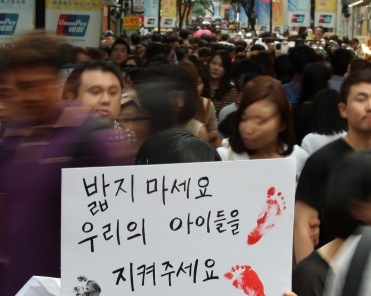The authorities failed to arrest the suspects in more than 9,000 cases of sexual assault between 2007 and 2011, data showed Wednesday.
According to National Police Agency data, 81,860 sex crimes including rape were investigated during the five-year period.
According to National Police Agency data, 81,860 sex crimes including rape were investigated during the five-year period.

However, law enforcement authorities failed to arrest the attacker in 9,189 or 11.2 percent of the cases.
Observers point out that with the majority of sexual assaults having been committed by a single attacker, there may be more than 9,000 sex offenders free in the population.
Of the 16,404 sexual assault cases that led to an arrest last year, 15,618 cases were committed by a single attacker.
The data also showed that both the number of sexual assault cases and the proportion of unresolved cases have increased significantly from 2007 to 2011.
In 2007, 13,396 cases of sexual assault were investigated, and 90.5 percent of the cases resulted in the arrest of the suspect.
In 2011, however, 19,498 cases were investigated but the arrest rate fell to 84.1 percent.
The number of cases involving minors increased at a much higher rate over the same period.
In 2007, 857 sexual assault cases involving minors were investigated. Of the total, 46 or about 5.3 percent of the cases did not result in an arrest.
In comparison, 2,054 cases of sexual assault against minors were reported in 2011, of which 139 cases remain unresolved.
The data also showed that 12.3 percent of cases involving children were committed by those who are known to the victim, while 9.2 percent of cases involving adults were committed by acquaintances.
In addition, the figures showed that assaults on children are more likely to be planned than those on adult victims.
According to the data, 27.3 percent of child molesters said that they were under the influence of alcohol during the assault, while 43.8 percent of sex offenders who attacked adults said that they had been drinking.
As sex crimes and the authorities’ handling of related issues continue to gain public attention, local politicians are suggesting increasingly tougher measures.
Following the series of high-profile sexual assault cases, politicians have called for a wider implementation of chemical castration.
Rep. Park In-sook of the ruling Saenuri Party, however, is taking the measure further and on Wednesday submitted plans for legislating a law enabling “surgical treatment” of sex offenders.
The suggested act will enable the judiciary to order the physical castration of offenders who are deemed unable to be rehabilitated or considered highly likely to commit further sexual assaults.
“The law enabling the use of chemical castration was passed in the 18th National Assembly, but the method can result in side effects from the chemicals, and can also lead to strong urges when treatment is stopped,” Park said.
“In order to sound an alarm on sex crimes, special measures such as (surgical) castration need to be introduced.”
By Choi He-suk
(cheesuk@heraldcorp.com)

















![[KH Explains] Hyundai's full hybrid edge to pay off amid slow transition to pure EVs](http://res.heraldm.com/phpwas/restmb_idxmake.php?idx=652&simg=/content/image/2024/04/18/20240418050645_0.jpg&u=20240418181020)

![[Today’s K-pop] Zico drops snippet of collaboration with Jennie](http://res.heraldm.com/phpwas/restmb_idxmake.php?idx=642&simg=/content/image/2024/04/18/20240418050702_0.jpg&u=)